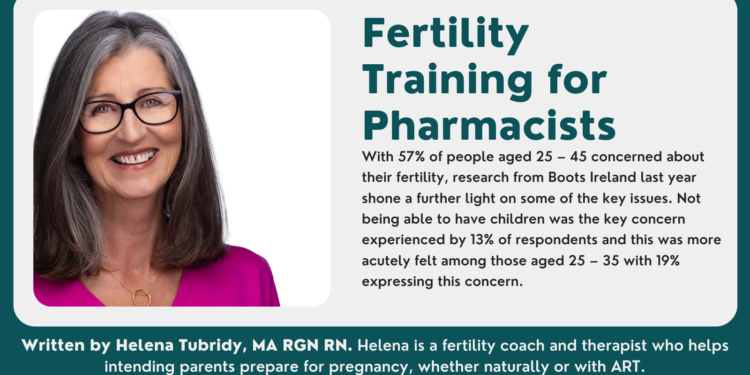With 57% of people aged 25 – 45 concerned about their fertility, research from Boots Ireland last year shone a further light on some of the key issues. Not being able to have children was the key concern experienced by 13% of respondents and this was more acutely felt among those aged 25 – 35 with 19% expressing this concern.

Community pharmacists have a key role to play with this particular group of patients, as the central healthcare professional within communities across Ireland.
Not being able to afford fertility treatments was listed at 12% while 11% of respondents are concerned that they might not find out about their fertility issues until it’s too late. The research also demonstrated a lack of awareness of where to go to seek advice on fertility issues.
While 72% of respondents agreed that people are starting to be more open about fertility and infertility issues, the research showed that a gender divide exists with 57% of respondents believing that the woman should shoulder most of the responsibility of fertility and family planning.
The research also investigated the impact that people’s fertility journeys have on them. Stress and anxiety is experienced by 14% of people with 13% of people saying it affected their mental health. It causes stress in relationships for 13% of people and 6% reported that their relationship ended as a result.
We spoke to Helena Tubridy to learn more about what pharmacists and their teams should consider when dealing with fertility patients.
Helena Tubridy MA RGN RN is a fertility coach and therapist who helps intending parents prepare for pregnancy, whether naturally or with ART.
Her background is in midwifery and gynae nursing, with a Master’s in Bioethics and Fertility. She also provides support and brief-therapy following miscarriage, stillbirth, and birth trauma.
Helena’s new online course is ‘Fully Charged Fertility’, a 6-part selfpaced roadmap to understanding and improving fertility to achieve pregnancy more easily and identifying any roadblocks.
Helena told us, “Community pharmacists are often the first exposure to healthcare professionals for those on the fertility journey. I always recommend my clients seek out help from, pre-conception to pregnancy and way beyond.
“Pharmacists would frequently be the first healthcare professional I recommend, providing warmth, reassurance, expert knowledge and guidance.
“For pharmacists and pharmacy teams it is important you think about rapport building, with discretion assured, and providing support at a vulnerable time. It’s second nature to you already.
“Furthermore, don’t be afraid to engage – normalising questions about fertility supplements, the benefits of probiotics and so on. You know a lot, you thrive on accuracy, can bust myths, and help people feel less alone.
“Pharmacists should think about their ‘bedside manner’ and the placebo effect. Alia Crum’s research shows mindset around medications may even minimise side-effects.
“Customers may already have a child who was easily conceived. Secondary fertility can be perplexing and frightening. No one wants to require assistance in conceiving. It’s regarded as the most natural thing in the world for women and men. Self-confidence is eroded with feelings of failure, and self-blame.”
Helena adds that IVF drug packs can be daunting for many. They take up a lot of room in the fridge, and make it all seem quite clinical and scary. It is vital therefore, she adds, that pharmacists can teach and support these patients on ‘unboxing’ and living with their treatments.
She adds, “Customers need to know about transportation and storage of drugs, administration, and side-effects. Drugs cost a lot and are a major investment for your customer.
“Advise them on the timing of medicines, the doses, what ‘bd and tid’ actually mean in their daily routine. Check it’s the correct medication, size, expiry dates in order, no cracks or damage to the container.
“For example, is the Gonal-F pen the correct size?
“Encourage these patients to consider their doses and explain why doses/schedules may vary within a cycle, or in a new cycle based on optimising hormone levels. They should be prepared for every eventuality, for example, what happens if they are away from home or travelling abroad?
“Pharmacists should also ask themselves, can you ensure a regular supply? What about responding to changes in prescription, are we as a team equipped for that?
“Consider how responsive you are in person, by phone and online. For example, are you available at weekends and during holidays or is it locum coverage? These will be important pieces of information for the patient.
“Websites can prove to be a great resource for fertility patients. One complaint I often hear is that they may not be updated or current. If you are providing information to customers within this realm then aim for brief blogs that inform.
“Injections are often a scary thought for new patients, and may need doing twice daily – so how about a good demo video on your website? Consider showing them how to prepare for an injection; Sanitisation requirements; drawing up, mixing, changing needles and administering an injectionangle and depth; taking care of the injection site and disposal of sharps.”
For updates on Instagram: Helena Tubridy
Read the March IPN Magazine here











